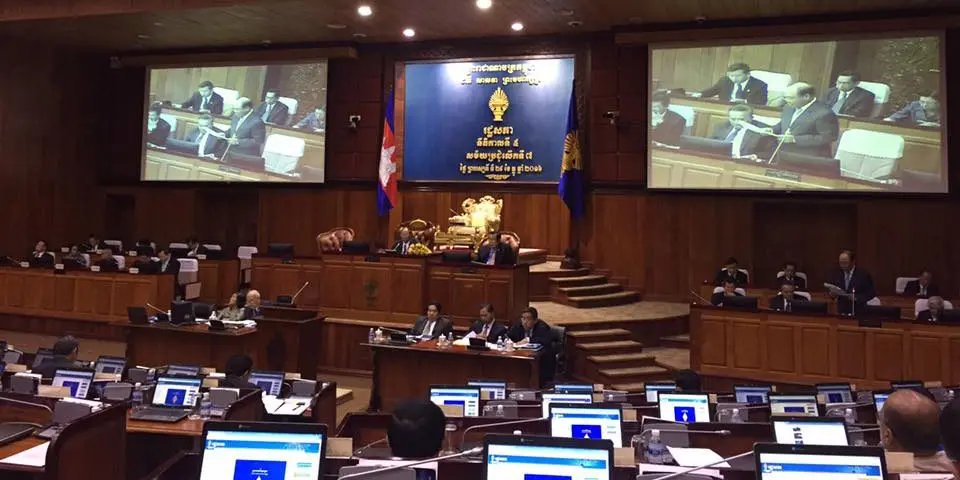
ASEAN parliamentarians condemn moves to eliminate opposition in Cambodia
October 17, 2017

JAKARTA – The Cambodian government’s recent push to shut down the opposition Cambodia National Rescue Party (CNRP) and lay the groundwork for its dissolution solidify the country’s rapid descent into one-party rule and effectively eliminate the possibility of credible national elections next year, ASEAN Parliamentarians for Human Rights (APHR) said today.
The collective of regional lawmakers raised the alarm a day after the ruling Cambodian People’s Party (CPP) advanced new amendments to several election-related laws, which would allow for the redistribution of parliamentary seats and other elected offices in the event of the CNRP’s dissolution. The moves in Parliament came less than a week after the Ministry of Interior filed a lawsuit with the Supreme Court to dissolve the CNRP.
“Opposition leader Kem Sokha’s arrest on bogus charges of treason in early September revealed the government’s intentions to eliminate the opposition at any cost. These new developments threaten to cement effective one-party rule into the legal framework and deny Cambodians their fundamental right to freely elect their leaders. It’s yet another slap in the face to the 44 percent of Cambodians who voted for the CNRP in 2013 and deserve to be represented by those they elected,” said APHR Chairperson Charles Santiago, a member of the Malaysian Parliament.
During Thursday’s National Assembly session, which was boycotted by the CNRP, the body’s Permanent Committee put forward new amendments to four laws, allowing for the redistribution of seats that had been won by the CNRP during previous elections to other parties that had contested those same elections, should the CNRP be formally dissolved. The laws up for amendment are the Law on the Election of Members of the National Assembly, the Law on the Election of Senate Members, the Law on the Election of Commune Councils, and the Law on the Election of the Capital/Provincial and Municipality/District/Khan Councils.
“These new amendments are a brazen attempt to legitimize a wholly undemocratic move: giving positions at all levels of government to parties who, instead of earning the vote of the people, sold their loyalties to the CPP. The ruling party wants to be able to argue that Cambodia remains a multiparty democracy, but no one should be fooled.” Santiago said.
“Make no mistake: if the CNRP is dissolved, the result will be one-party rule in Cambodia. The government selecting its own competition and eliminating anyone who poses even the remotest threat does not constitute a genuine multi-party system,” he added.
The rush to amend these laws comes on the heels of a lawsuit filed at the Supreme Court by the Ministry of Interior on 6 October requesting the dissolution of the CNRP in accordance with new amendments to the Law on Political Parties. APHR called those amendments a “death knell for democracy” at the time of their proposal in February 2017, and numerous other local and international voices raised similar alarm at their passage. The Ministry of Interior’s lawsuit followed similar complaints filed by the Cambodian Youth Party and the royalist FUNCINPEC party, and the CNRP now has less than 20 days to submit evidence to the court in its defense.
“Kem Sokha’s arrest was unfounded and unacceptable and highlighted the deep flaws in Cambodia’s justice system. Moving now to dissolve the CNRP before he even goes to trial is beyond absurd. There is zero credibility to any of the government’s arguments, which are based on laws drawn up and revised by ruling party MPs to fit Prime Minister Hun Sen’s political agenda. This is the clear weaponization of the legal system to subvert the rule of law,” said APHR member and Philippine Congressman Tom Villarin.
“Since the 2013 national elections, Hun Sen has been on an unrelenting rampage to completely dismantle Cambodia’s fragile democratic institutions, and neither the judicial nor the legislative branches have even tried to stop him. While we always kept up hope that the tide could be reversed, there now appears to be no chance that next year’s elections can be considered genuine,” Villarin added.
Even without the formal dissolution of the CNRP, current conditions – if not dramatically reversed – preclude the possibility of credible elections in 2018, APHR argued. Parliamentarians said it was high time for the international community to take decisive action to counter the descent into one-party rule in Cambodia, including by making continued assistance contingent upon a return to democracy.
“Anyone who thinks genuine, participatory, and inclusive elections are still possible in 2018 under these circumstances is gravely mistaken. The international community’s engagement with Cambodia, including monitoring of the elections, should be conditional upon the restoration of democracy, which must include freeing and dropping all charges against Kem Sokha and other political prisoners, removing threats against all opposition lawmakers, reversing moves to shut down and cripple the CNRP, and immediately reopening of space for civil society and independent media,” Santiago said.
ASEAN Parliamentarians for Human Rights (APHR) was founded in June 2013 with the objective of promoting democracy and human rights across Southeast Asia. Our founding members include many of the region's most progressive Members of Parliament (MPs), with a proven track record of human rights advocacy work.